Honey and ghee are the two food substances that are widely used in our diet. In Ayurveda, it is said that two ingredients or compounds with opposite qualities i.e, cold hot and so on, should not be mixed in equal quantities.
Ghee has a cooling effect on the body, whereas honey is said to add to body heat. According to Ayurveda mixing equal amounts of ghee and honey cannot be beneficial. Ayurveda tells, in case of need you can mix one part of ghee with three or four parts of honey.
What is honey?
Honey is a sweet liquid that is made by using bees nectar. The taste of every honey varies depending upon which type of flower the nectar was harvested. Honey has high levels of monosaccharides, fructose, and glucose. It also has 70-80% sugar which provides sweetness to it. It also has antiseptic and antibacterial properties.
Benefits of honey
1. Has several nutrients
Nutritionally, 1 tablespoon of honey (21 grams) contains 64 calories and 17 grams of sugar, including fructose, glucose, maltose and sucrose.
2. Rich in antioxidants
It is said in two studies that, buckwheat honey which is high quality honey increases the antioxidant property of honey.
3. Improves cholesterol
Few studies have proved that honey can reduce your cholesterol levels.
4. Maintains heart health
Honey is rich in phenols and a few antioxidant elements which helps in maintaining a good heart health.
5. Healing property
As honey has antiseptic, antifungal and antioxidant property it is used as a healing agent to wounds, burns and cuts.
6. Reduces cough
Consuming a tablespoon of honey during dry cough can help in reducing dry coughs. It is one of the natural remedy for cough.
7. Nourishes skin
Honey is one of those natural moisturizers which keeps the skin nourished and soft. It is very good for dry skin. It can also cure chapped lips.
8. Healthy drink
Honey and warm water is considered to be a healthy drink which helps for weight management. Even drinking hot milk with honey instead of sugar can also turn to be a healthy drink.
9. Improves memory
Consumption of honey prevents metabolic stress and lets the mind be calm. Thus when the brain is calm it improves memory as well as concentration in the individual.
10. Tasty
Honey is usually sweet. But it can also taste floral, smoky, nutty and woody depending upon the source of nectar. Usually honey is used instead of sugar in many foods or drinks.
How to check pure honey?
Add few drops of honey into a glass of water. If the honey gets settled in the bottom of the glass, it is said to be pure. But if it gets dissolved in water, it is adulterated by adding sugar.
Shelf life of honey
Honey can be used for about two years. If it stored in a sealed container then you can store it for even decades. Keep it in a dry and cool temperature. Do not let moisture get in contact with honey while using. Storing them in airtight containers are the best way to store and use them which in turn does not require refrigeration.
What is ghee?
Ghee is basically the essence of milk. It is a clarified form of butter. Ghee has a great taste and bold aroma. It is also loaded with certain benefits which is beneficial to the body and to cure ailments as well.
Benefits of ghee
1. High smoking point
Ghee has a high smoking point as it does not break down into harmful radicals under high temperatures. Thus ghee is suitable for cooking purposes.
2. Loaded with fat-soluble Vitamin A, D, E and K
Ghee is loaded with vitamins like Vitamin A, D, E and K. Vitamin A in ghee helps in the proper functioning of the body parts like kidney, lungs and liver etc. Vitamin D and K2 help in maintaining strong and healthy bones and also cancer, type 1 diabetes. Vitamin E boosts the immune system.
3. Contains CLA
CLA is Conjugated Linolenic Acid which enhances the mitochondrial function of the body.
4. Antioxidant and anti-inflammatory property
The high concentration of butyric acid has antioxidant and anti-inflammatory agents. Ghee also acts as a healer due to its healing property over wounds, burns and cuts.
Read our Blog – Ayurvedic Natural Wound Healing: How Ghee Is Used
5. Used in Ayurvedic treatments
Ghee is widely used in Ayurvedic treatments such as Netra tarpana, Nasya treatment and various other massage treatments also. There are several other treatments as well as home remedies.
6. Improves digestion
Ghee can be easily digested as it is fat-soluble in nature. It is said that the consumption of ghee and milk can be used to cure constipation problems. By having a spoonful of ghee mixed with milk at night every day you will not have any constipation issues.
7. Weight manager
It is a myth if you are still believing that the consumption of ghee will gradually increase your weight. Ghee is used to managing weight, may it be gaining weight or reducing weight. It goes good for both! But always remember that too much consumption of ghee than required will lead to obesity.
8. Beauty enhancer
Ghee is a natural beauty enhancer. It is used in various remedies to enhance beauty. It is a natural moisturizer, hair conditioner, lip care and what not!
9. Energy booster and immunity enhancer
Ghee has a high content of antioxidants and medium-chain fatty acids which makes it an energy booster and immunity enhancer.
Buy Cow Ghee Online: Order Now. Free Shipping
10. Incredible taste
Ghee has an incredible taste. It is widely used in cuisines, especially in Asia. It also has a bold aroma which adds to the nutty flavour of ghee.
Read our blog – Pure desi cow ghee – the ambrosia of mankind
How to check pure ghee?
Add a spoon of ghee to a pan, if the ghee turns dark brownish in colour then it is pure. But if it turns yellow in colour it is adulterated.
Check the purity of ghee with different methods
Ghee may be additionally referred to as drawn butter is a regularly used ingredient within the Indian kitchen and is taken into account to be a family logo and prosperity.
However, there are several cases around the adulteration of ghee. Rancid ghee is additionally referred to as vanaspati and is usually sold within the name of ghee, this is often just because of the similar colour and texture.
According to Ayurveda, ghee is a crucial ingredient used for ayurvedic medicines because it promotes healthiness and helps in growth. Apart from this, it detoxifies the entire body and provides nutrition. To ascertain if the ghee you’re using is pure or not, there are several methods that you can easily try. Some of them are listed below:
Method 1:
One of the only methods you’ll use to find out the impurity of ghee is by heating a teaspoon of ghee. If ghee melts on heat quickly and turns dark brownish, then it is pure ghee. If it needs time to melt and turns light yellow, then it’s adulterated.
Method 2:
Melt some ghee in a glass jar using the double-boiler method and pour coconut oil into the glass jar, put this jar inside the refrigerator. If ghee and the coconut oil form will be placed in separate layers, then the resulting ghee is adulterated else the ghee you’re using is pure.
Method 3:
Add an equal quantity of concentrated HCl and ghee with a pinch of sugar. Heat all the ingredients into a tube, and shake well to mix the ingredients. If a colour change to pink or red in the bottom layer shows the sample is adulterated with rancid ghee like hydrogenated oils/ vanaspati ghee.
Method 4:
Take a teaspoon of ghee on the palm of your hand, if ghee will melt by body heat then it’s pure else the ghee you’re using is impure.
Method 5:
Just add iodine solution to a small quality of melted ghee. If the iodine solution added to the ghee turns purple, the ghee is adulterated with starch.
The Shelf life of ghee
Ghee can be stored for 8-10 months in airtight containers. Store them at a cool and dry temperature without letting them come in contact with moisture. You need not refrigerate it but if you wish to, you may store it in a refrigerator to avoid spoilage after a certain period of time.
In Ancient Indian knowledge, it is said that mixing an equal amount of honey and ghee can be poisonous. The question or myth that mixing ghee and honey is poisonous cannot be accepted in some contexts.
Moreover poisonous is likely not preferred to be used, as it may cause problems or effects after due course but not suddenly prone to death. But mixing heated honey and ghee is not prefered, could be correct to an extent. Honey contains Clostridium botulinum, a bacteria. Milk is considered to be the best medium for bacteria to grow and multiply.
So when honey is mixed with milk or milk products these bacteria multiply and then, in turn, produce some toxins which are not at all good for the body.
FAQ
The gossip that a combination of ghee and honey in equal proportions can be harmful and is deficient in scientific support and is inaccurate.
Mixture of ghee and honey in equal proportion is a customary exercise that is not considered to be toxic. Ghee and honey, both of them are common food ingredients commonly deemed safe when intake in moderation.
In Ayurvedic medicine, the universal use of ghee and honey is mostly acknowledged for its health benefits. Irrespective, as with any food or dietary supplement, it is pivotal to practice moderate consumption regarding their high-calorie consistency, which can add towards weight gain and other health issues if consumed more than required.
In contrast to the claim, there is no scientific confirmation that would support the illustration that the combination of ghee and honey in proportion is toxic. Such combination has been included for centuries in both culinary and conventional medicinal practices, and it is mostly considered as safe when utilized in moderation.
The ideology that a combination of ghee and honey is harmful is certainly a myth unsupported by scientific verification. Ghee and honey are extensively considered as safe food components acceptable for consumption in minimal quantities.
While excessive consumption of such substances may result in weight-related concerns and further health problems, a balanced and moderate approach is generally recognised as safe for most individuals. It is suggested to practice moderation and, when in doubt, consult with a healthcare professional to plan your diet in accordance with your individual requirements and health conditions.

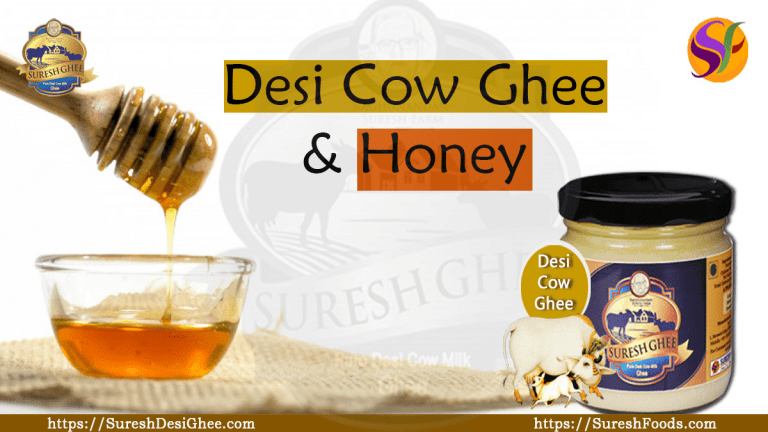


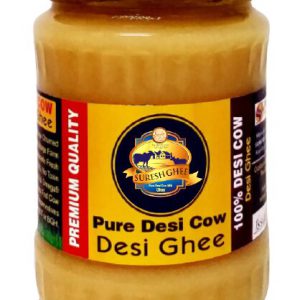
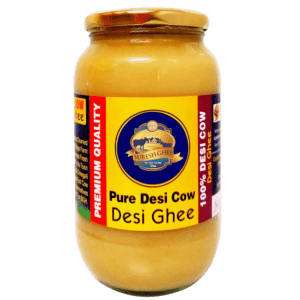
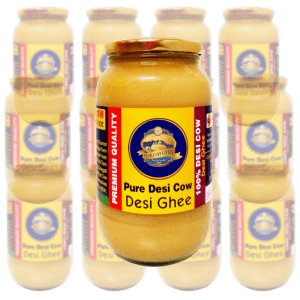
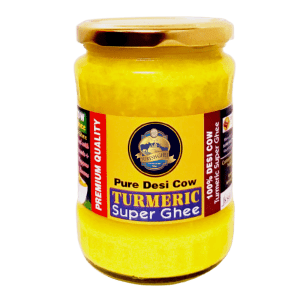
 WhatsApp us
WhatsApp us
Naveen m...